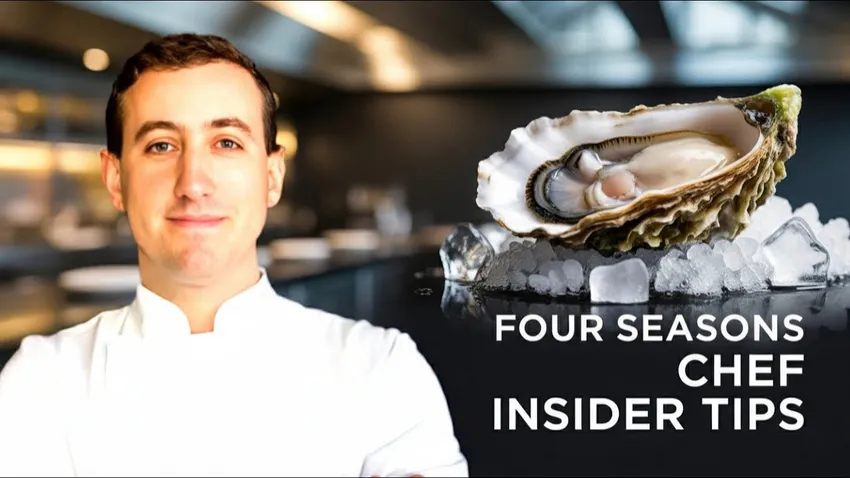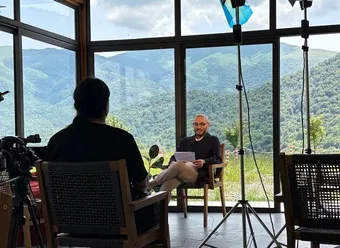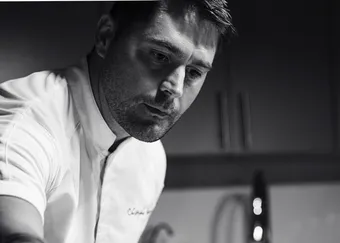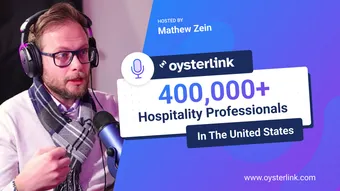What's the right recipe for a successful culinary career? Chef Marco Calenzo has a strong opinion. The seasoned chef, currently with the Four Seasons in Miami, traces his path from Florence to the global stage and explains why young cooks need to slow down to grow stronger. We at OysterLink recently sat down with Marco Calenzo to talk about his journey.
Please introduce your career path and share a bit about your journey
Marco Calenzo: I started in Italy. I was born in Florence, a great city for the Renaissance and for art, and this is how I started. I did the catering school at Bernardo Buontalenti before going first to some of the Michelin Star Kitchens across Italy, so I started in Florence, worked in Imola and Verona, and worked a little bit in other areas of Italy. Before moving for the first time, I was 26, as Executive Sous Chef at Ustairs, a restaurant in the UK, inside the Lanesborough Hotel, where, from there, my international path began. So the restaurant was awarded a Michelin star, and later, from that, I also traveled a little bit. So I've been in Beijing, in Hawaii, back to London, and now in Miami.
And where do you work in Miami right now?
Marco Calenzo: Miami, as I mentioned, is the Four Seasons Surf Club, so in Miami Beach. I'm also helping a school, it's called Love to Italy Academy. So it's a school that is all about Italian cuisine, Italian products, and basically reinforcing the “made in Italy” image. I'm teaching the Italian tradition, how to use the products, and so on. So I believe it's a good thing because I kind of love it; basically to share my knowledge with people and explain to them the truth about how to use the product and how to cook Italian like an Italian.

And what do you prefer more, cooking or teaching?
Marco Calenzo: I think both are nice, so I personally love both of them. I think that before you start teaching, you need a solid base in cooking. But it's both really enjoyable and depends on the time. But of course, staying with people and sharing your knowledge is something I find even more important during this time in my career. That's why I enjoy doing it when I can.
How long have you been with the Four Seasons?
Marco Calenzo: So the Four Seasons now is, here in Miami, two years, and I've been working for Four Seasons before Miami for almost five years. So, I would say, quite seven years.
Given your experience, what are the biggest mistakes entry-level Italian food chefs make?
Marco Calenzo: I think when we talk about mistakes, there are no mistakes. And when someone makes mistakes, I believe you need to see it as a learning path. So, making mistakes is actually what people who make things do.
So when you make mistakes and realize you did, I think this is a learning tool that will help you later not make those mistakes again.
Nowadays, I see many young chefs who finish school and want to grow very fast. I think this could be maybe the biggest mistake because I believe that doing the right path and the right time, it grows you stronger. And you don't realize it in the beginning, but you will realize it later when you have your knowledge.
When you walk into a kitchen, it's important to do all the stations of the kitchen. I personally started in the pastry.
So, because no one wants to work in pastry, let's say they throw me there. And actually, nowadays it's the one thing I enjoy the most. So that's why I love to make sweets. I love to eat sweets. And I have a good knowledge of pastry as well, which many chefs sometimes skip. So I believe that you shouldn't skip any part of the kitchen because
The area will come back in the future, especially when you manage an entire kitchen. The more knowledge you have about everything, the easier it will be for your job later on.
What is the most valuable role to seek out in a kitchen when entering this industry?
Marco Calenzo: Think more than the role, think about my personal experience and what I suggest to the new chefs, basically joining the new kitchen. First of all, think you should eat in the restaurant or the hotel, basically, in the kitchen where you want to work.
I think you need to eat first and love what you're eating. So for me, there is no point in going in and working for a chef, for a place where you don't like the food.
So I understand sometimes we think it's good to work in this hotel because it's good for my CV. But I think it's more important to work for a chef that you trust, who can give you more. And of course, working for a place where you believe you can learn more, because sometimes even in a famous hotel, a famous restaurant, maybe you don't have the learning curve that you can have with the proper chef who will follow you all the way for the next, for all the steps.
So I think eating first, loving what you eat, and then applying for a restaurant and applying by person, not sending the CV, just walking inside the restaurant, speaking with the waiter, asking if you can have a chat with the chefs. I think this is the easiest way because the chefs will see that you are really interested in getting that job.
Nowadays, you want people who come to work not just for the money, but because they want to learn. I think this is the most important thing.
I've heard this, by the way, a few times so far: the best way to get a job is to go knock on doors and talk to people right away.
Marco Calenzo: Yes, so I think it's the best way when you are young, meaning it's the best way because they see you straight away, they see your interest in the place, and it's all that chefs are looking for, people who really want to have that experience and to spend time in a certain place. I think this is the beginning of the career; later on, I believe it's not like that. So later, when you start to grow your career, you can arrive at a point where you are not knocking on people's doors, but it will be like places reaching out to you. So, based on the experience you have gained and what you have left behind in the previous jobs.
What is the most important skill for someone interested in beginning their role in Italian cuisine?
Marco Calenzo: If someone can travel to Italy, it would be a good benefit. I believe that when you work in a place that serves Italian cuisine, it helps a lot to take a quick trip to Italy to see the lifestyle and eat around. And I think when you travel, especially in a new place, you learn a lot. You learn a lot sometimes just by seeing people, their habits, and how they interact.
When you travel to Italy, you'll find different food in every region. So it's something that takes a lot of time. But I would say even a first trip will help a lot, at least to say you've been to Italy
Spend at least one or two months in an Italian kitchen; you know, maybe you can do that on a trip; you can knock on a door. You say you know, doing like a stage but for free, so just to experience yourself the beauty of being in an Italian kitchen surrounded by people from a different country than yours, and see the habits.
What's your typical timeline to develop a menu item?
Marco Calenzo: I think some people make this a very easy process, and people who take a lot of effort to develop something new. I believe that everything is being invented, but there is a way that you can do your own interpretation of something. And having more experience will help you develop something more easily than when you don't have any.
Given your career path, are you still interested in opening your own place one day?
Marco Calenzo: Of course, it's something that is always in my mind. I believe I'm in a career where I'm happy with the company I work for, so everything's great. But of course, something I would like to do one day is open my own place, either to find an investor, or to put a lot of ideas into practice, and to develop a new concept. So there are things that I have in mind. But of course, I'm really happy where I am now, so it will be something that I will build on the side, on top of what I'm doing at the moment.
Find available head chef jobs in Miami, or check out more interviews like this brought to you by OysterLink to learn about the industry. You can also get them straight to your email by creating an OysterLink account and joining our newsletter.






Loading comments...